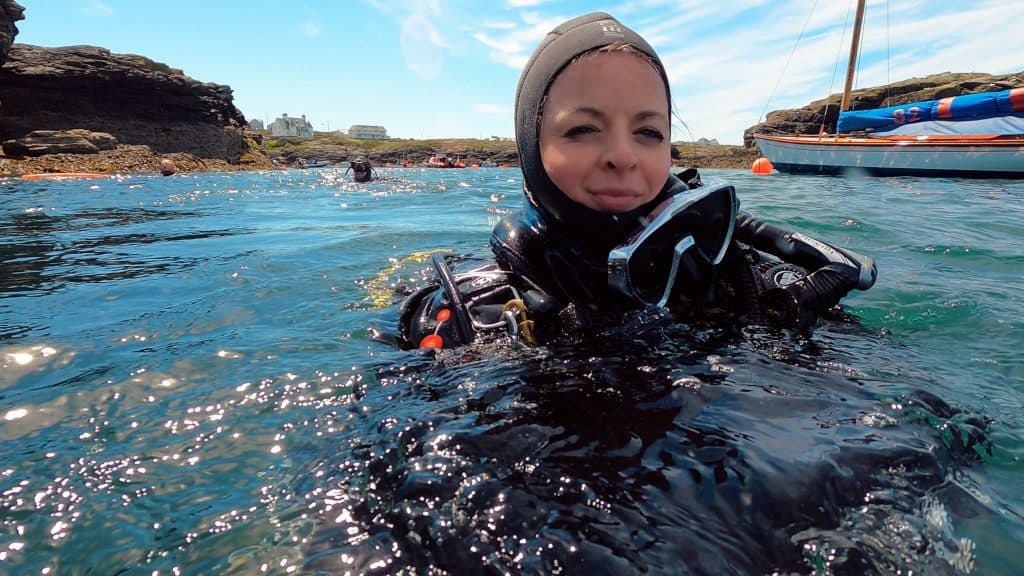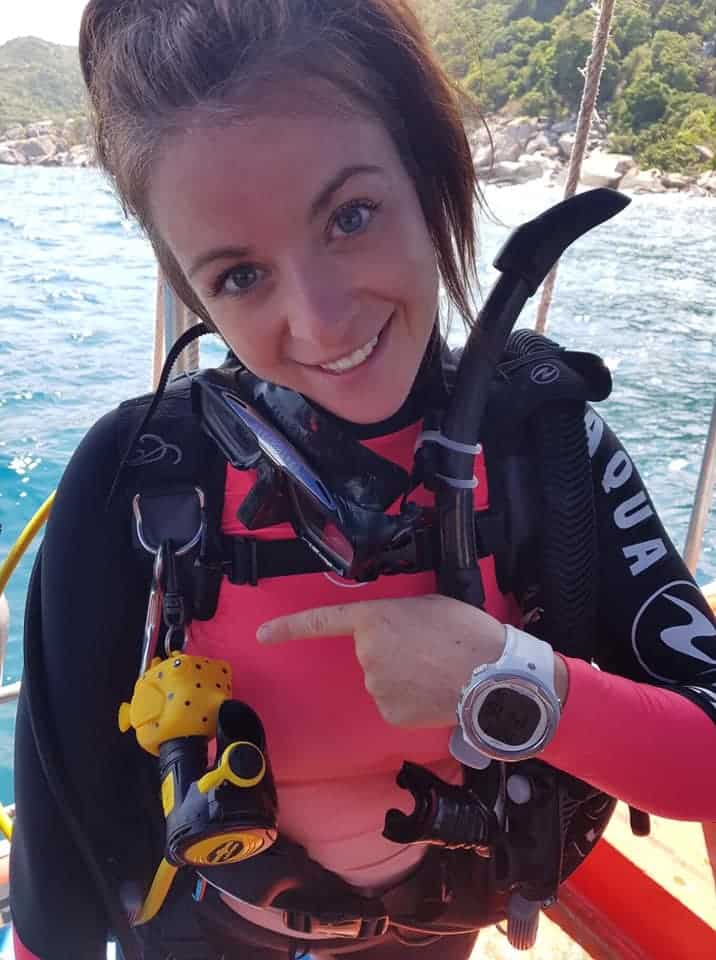For those of us with long hair, scuba diving can sometimes be a bit of a learning curve. How do you keep your hair from getting in the way, getting tangled in your first stage, or even tangling up when you get out of the water?
Long hair doesn’t need to be a burden when you go scuba diving – it’s all about being smart about what you do with it in and out of the water. After all, scuba divers all over the world manage to keep their hair under control – how do women (and men) with long hair or troublesome cuts cope in the deep?
If you’re new to the phenomenon – and puzzle – that is managing scuba diving hair, I’ve lined up a few great ideas below that will help you to keep your hair in order from dive to dive.
Table of Contents
Choose a Hood
If all else fails and you really don’t want to try and contain your hair on a scuba dive, then you can always wear a hood or a even a beanie hat. I’ve never tried wearing a beanie hat underwater, but have bumped into divers that swear by them!
Scuba diving hoods are incredibly popular with people who have long hair – it’s really easy to keep your curls out of your face and your silicone mask straps too – meaning that if you normally have trouble getting your hair caught in a mask strap or two while on route, a hat or hood could lock your locks away.

Neoprene mask straps are brilliant and some models of masks already come with them built in. This is one of the things I love about my Oceanic Shadow Mini. But you can buy a range of great neoprene mask straps too. Click here to check out the variety available on Mikes Dive Store or purchase our Shark Guardian mask strap. They are really cheap and will last for a long time!
What’s more, you may want to use coconut oil alongside. This can help to stop your hair from getting too dry post dive – I’ll go into this in a bit more detail further down, but it pretty much acts as a natural leave in conditioner.
Wear a Headband
Headbands also make for great alternatives to actively managing your hair while scuba diving, though they are not always preferred by everyone.
Wearing a buff will, again, help you to keep troublesome hair out of your face and mask during a scuba dive, but it won’t necessarily keep your hair from drying out when you leave the water.
What About a Hair Band?
Hair ties and hair bands tend to be popular with women who dive with long hair – and of course, they are general staples of hair care when it comes to keeping your locks under control out of the water, too.
If you’re looking to set up a ponytail or braid, this is one of the cheapest and most reliable ways to keep your hair healthy when scuba diving. However, it’s not always the most reliable, and it can take a bit of fiddling about before and after your dive.
If you’ve always suffered with ‘dive hair’, then hairbands and hair ties are likely to keep hair out of your face – but you’ll need to consider whether or not they are worth the hassle long term.
When I was delivering up to 20 Discover Scuba Dives per day, I was in and out of the water every two hours and would always have to take my hair band out, brush my hair, and then re-do it before the next dive. It was quite hard work!

If you choose this method of restraining your hair, I advise wearing a high ponytail. I have been in situations where I worn low pony tails and my hair has got tangled in my first stage or around the cylinder valve – there is nothing more painful! If this happens to you, remember to stay calm and simply signal “problem” to your buddy and point to your pony tail. If you’ve got a good buddy, they will help untangle you!
Braids
Setting up a French braid, a mermaid tail or pigtails is a great short-term solution for diving in salt water and more besides – and you can easily wear this hair under cover of a hood.
Braid your hair before diving and you will likely find that you can keep your long hair out of your mask and straps with ease. However, again, it’s going to need a bit of fiddling before and after for any diver with long hair.
You can also leave in conditioner when you braid, too, to help protect your hair before you get back out of the deep again.
Use the Right Hair Products
Before you go underwater, it’s always a good idea to try and treat your hair with the right conditioner and protection. Yes – controlling your hair with a headband or hood will work wonders if you are struggling to get your hair out of the way – but when it comes to getting out of the water, girls and women alike are going to need more than a simple tie back or silicone cover to stop their hair from drying out. Diving hair becomes typically dry, and quite quickly too.
It’s therefore worth checking online for specific eco-friendly conditioner recommended for divers that you can use on your hair before you dive in. These conditioners not only protect the hair on your head when you enter the water, they also help to protect the reefs, too -always look for a reef safe hair conditioner, shampoo and sunscreen before you go scuba diving. Stream2Sea is a good brand to start with!
Did I mention that you should try and leave in hair conditioner, too? Braids or no braids, you’ll thank me for that one later!
Try Coconut Oil

Coconut oil is one of those brilliant resources that everyone and their mother recommends for all kinds of things – and in this case, I’m suggesting you try it on your head and hair!
It’s worth doing further reading on coconut oil in general – I really don’t think you can go wrong with the best conditioner off the shelf, but many divers prefer to go natural – and rightly so, I can understand that – it’s the more eco-friendly preference. There are a LOT of chemicals in hair care products that can cause damage to the marine environment, so do try your best to avoid these.
Rinse Your Hair with Fresh Water
This is a tried and tested tip for all kinds of hair – forget the advanced tips for now, and just make sure you rinse your hair as soon as you get out of the water. In fact, it may actually be worth you rinsing your hair first before you go underwater. That’s because pre-soaking has an amazing effect on your hair – it means that the salt water will affect it less once you’re in the deep.
However, it’s also a great idea to wash your hair thoroughly in fresh water the moment you exit the water. This is so that you can effectively remove any salt that’s likely to be clogging up your strands and drying your hair out in the bargain. Salt water unfortunately can do all kinds of damage – and anyone with long hair who is used to scuba diving will likely tell you this is a common complaint!
I can vouch on this one. Cleaning my hair with fresh water on the boat, immediately after dives, made a noticeable positive difference to the state it would get in!
Can Divers Have Long Hair?
Absolutely! Many divers and scuba diving enthusiasts have long hair. Therefore, many people into their diving will likely tell you that from getting hair caught in a mask strap to experiencing dryness out of the water, there’s always likely to be a bit of a learning curve. It’s not just about what you wear, it’s about the hair care you employ too.
Divers with long hair should either consider covering their head and neck from the water and sun, or should look for protection in the shape of adaptable shampoo and/or conditioner before they enter the water. Don’t let dive water ever be a problem – scuba diving hair can be annoying, but we’ve come a long way in finding some fantastic solutions.
What is the Best Way to Wear Your Hair While Scuba Diving?
The jury is out – preventing scuba diving hair from getting tangled, in the way, or drying out is a learning experience. One diver might choose a neoprene mask or hood, while others may choose a tie or two. Others may even go for a full French braid, pigtails, or even use specific hair care like reef friendly shampoo before they get in the water.
Keeping your hair secure and out of your face during dives is absolutely a safety and a comfort point as well as one of style – so before you go underwater, show your hair a bit of care and be willing to try out a few different solutions!

